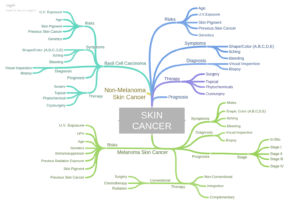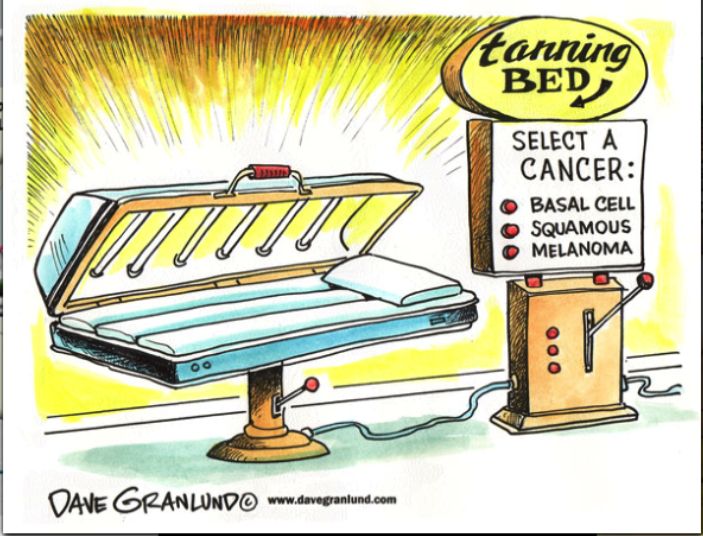“In order for clinicians, patients, and payers to make informed decisions about treating Basel Cell Carcinoma, new RCT or high-quality NRCS evidence is needed.”
A side effect of my autologous stem cell transplant (MM diagnosis ’94) is the increased risk of non-melanoma skin cancer (NMSC). Basel cell carcinoma is a type of NMSC. Also, I repeatedly sunburned my skin as a youth. Anything for a sun tan…
When a brown spot surfaced on my face I decided to go see a dermatologist. I had the spot removed and analyzed. The pathology repost came back “inconclusive.” But I decided to research NMSC and add evidence-based therapies cited to reduce my risk of skin cancer. This post is a collection of some of my research.
I put the word Best in quotes above because experience has taught me that there is never one single definition of a best cancer therapy. When it comes to basel cell carcinoma, best means different things to different people. Further, several doctors are quoted below saying that the study has limitations. For the record, of all the 000’s of cancer studies I’ve read over the years, the vast majority have had “limitations.”

Having said all that, I did think that basel cell cancer patients and survivors may want to read about different BCC therapies and their risks of BCC relapse so I am writing this post.
Remember- the key to a BCC diagnosis is to reduce your risk of melanoma.
Having had basel cell carcinoma treated myself and knowing many people who have had BCC treated with various therapies, I will list reasons why BCC survivors may (or may not) consider a therapy to be the “best.” I will relay my own BCC reasoning below each bullet point giving the patient point of view. Keep in mind that the list below is less than scientific…
- Risk of non-melanoma skin cancer relapse- “As a BCC patient in my 40’s my priority is to have the lowest risk of relapse.”
- How your skin looks once the BCC has been removed (scaring, etc.)– “While I don’t consider myself to be vain, as a BCC patient in my 40’s my priority is to have as little scaring as possible after the procedure.“
- How painful the procedure is– “Some therapies are more painful than others. I want the least painful procedure possible.”
- If your health insurance will pay for the therapy- “I care less about relapse, scaring, or pain. I just want my health insurance to cover the procedure.”
Keep in mind that the therapies listed in the article below are all conventional or FDA approved therapies. I live an anti-skin cancer lifestyle through nutrition, supplementation and lifestyle therapies. And the most important aspect of my anti-skin cancer lifestyle is that all of my evidence-based therapies enhance my skin health.
for example, all reduce my risk of NMSC and hopefully make my skin look healthier.
To Learn More About Basal Cell Carcinoma- click now
Have you been diagnosed with basel cell carcinoma? Which procedure, which therapy to you want and why? Scroll down the page, post a question or comment and I will reply to you ASAP.
Thank you,
David Emerson
- MM Survivor
- MM Cancer Coach
- Director Galen Foundation
Recommended Reading:
“Basal-cell carcinoma (BCC), also known as basal-cell cancer, is the most common type of skin cancer.[2] It often appears as a painless raised area of skin, which may be shiny with small blood vessels running over it.[1] It may also present as a raised area with ulceration.[1]Basal-cell cancer grows slowly and can damage the tissue around it, but it is unlikely to spread to distant areas or result in death.[7]
Risk factors include exposure to ultraviolet light, having lighter skin, radiation therapy, long-term exposure to arsenic and poor immune-system function.[2] Exposure to UV light during childhood is particularly harmful.[5] Tanning beds have become another common source of ultraviolet radiation.[8] Diagnosis often depends on skin examination, confirmed by tissue biopsy.[2][3]
It remains unclear whether sunscreen affects the risk of basal-cell cancer.[9] Treatment is typically by surgical removal.[2] This can be by simple excision if the cancer is small; otherwise, Mohs surgery is generally recommended.[2] Other options include electrodesiccation and curettage, cryosurgery, topical chemotherapy, photodynamic therapy, laser surgery or the use of imiquimod, a topical immune-activating medication.[10] In the rare cases in which distant spread has occurred, chemotherapy or targeted therapy may be used.[10]
Basal-cell cancer accounts for at least 32% of all cancers globally.[7][11] Of skin cancers other than melanoma, about 80% are basal-cell cancers.[2] In the United States, about 35% of white males and 25% of white females are affected by BCC at some point in their lives.[2]
“When treating low-risk primary basal cell carcinoma (BCC), surgery and external beam radiation yield a better chance of a cure and a lower recurrence rate compared with other treatment modalities. This is the finding of a recent meta-analysis published in the Annals of Internal Medicine.
Selecting the right therapy for BCC is challenging and should be based on many variables, including patient factors, tumor factors, and patient access to healthcare resources…
A total of 40 randomized trials comparing 18 interventions in 9 categories were identified and included in the study. A meta-analysis of mostly low-risk BCC patients was then conducted.
Drucker and colleagues found that the estimated recurrence rates were comparable for
- excision (3.8%; 95% CI, 1.5%–9.5%),
- Mohs surgery (3.8%; CI, 0.7%–18.2%),
- curettage and diathermy (6.9%; CI, 0.9%–36.6%), and
- external beam radiation (3.5%; CI, 0.7%–16.8%).
However, the recurrence rates were increased for
- cryotherapy,
- curettage and cryotherapy,
- 5-fluorouracil,
- imiquimod, and
- photodynamic therapy with either methyl-aminolevulinic acid or aminolevulinic acid.
In addition, patients were more satisfied with photodynamic therapy compared with excision or cryotherapy. According to the researchers, too little data existed to conduct an analysis of patient quality of life or mortality measures.
“On the basis of sparse evidence and with substantial imprecision, surgery and external beam radiation have lower recurrence rates than other modalities for the treatment of BCC,” concluded the researchers. “In order for clinicians, patients, and payers to make informed decisions about treating BCC, new RCT or high-quality NRCS evidence is needed.”
“The comparison of conventional surgery with Mohs micrographic surgery is flawed because Mohs is tissue-conserving by nature, which leads to superior cosmetic results for a given tumor,” he said. “The meta-analysis examined only low-risk superficial and nodular BCC. More aggressive subtypes are best treated with Mohs micrographic surgery, and this is widely regarded as the gold standard…”
This current study is limited in the number of tumors studies, and we know from larger studies that surgery, particularly MMS, is associated with a much lower cure rate than many other modalities. We have known for years that surgery is the gold standard, and this study does not offer enough evidence to argue the contrary.”



